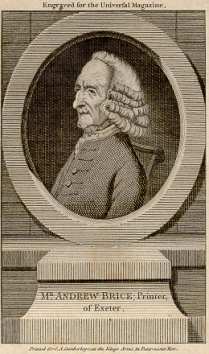Hide
hide
Hide
West Country Poets
ANDREW BRICE (1690-1773)

This man was the son of Andrew BRICE, shoemaker, and was born at Exeter in 1690. Although intended for the ministry, he was, from lack of means, apprenticed to a printer, and followed that calling throughout the remainder of his life. Whilst undergoing a long term of imprisonment for damages in connection with a lawsuit in which he had become entangled, he composed an heroi-comic poem in six cantos, entitled 'Freedom: a poem written in time of recess from the rapacious claws of bailiffs and devouring fangs of gaolers, by Andrew Brice, printer, to which is annexed the author's case, 1730, the profits arising from which enabled him to obtain his release. He also published a collection of stories and poems with the title of 'Agreeable Gallimaufry, or Matchless Medley.' His disposition was mirthful, and he was a great patron of the stage. In 1745, when the players were being persecuted at Exeter, he published a poem defending their conduct and attacking the Methodists, to which he gave the name of 'The Play-house Church', or 'New Actors of Devotion.'
Other works ascribed to him are 'A Humorous Ironical Tract' called 'A Short Essay on the Scheme lately set on foot for lighting and keeping clean the Streets of Exeter, demonstrating its pernicious and fatal efface ts,' 1755; the 'Mobiad, or Battle of the Voice: a heroi-comic poem, being a description of an Exeter election', 1738. His great work, however, was the 'Grand Gazetteer, or Topographic Dictionary, published in 1759. Many important West-Country works issued from his press. He died November 7, 1773, and was buried in Bartholomew Churchyard, Exeter.
[. . . no poems quoted . . .]
Transcribed by Sandra Windeatt from: Wright, W.H.K., (1896) West-Country Poets: Their Lives and Works. London: Elliot Stock, p.52
Portrait engraving of Andrew Brice from the Devon Library and Information Services website. © Copyright Devon County Council, 2002.
